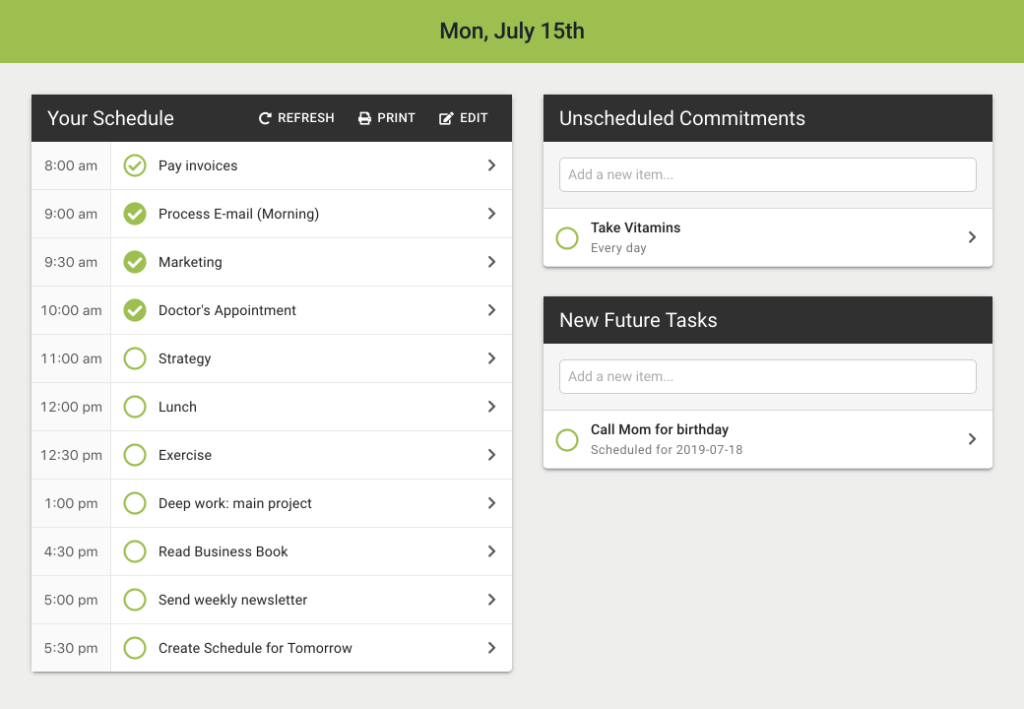Last Wednesday, OpenAI released their newest AI text generation model, ChatGPT, and I started experimenting with it to find out what sort of productivity advice it might give. Turns out, it’s not so bad. Some of it I couldn’t say better myself. Read on to see the advice it gave for 8 different questions I asked it.
Wondering what exactly ChatGPT is?
I’ll let it explain:
ChatGPT is a computer program that uses artificial intelligence to understand and respond to questions or prompts. It works by analyzing the words and phrases that you type and using that information to generate text responses that sound like something a person would say. This means that you can have a conversation with ChatGPT, just like you would with a friend or family member. ChatGPT is a powerful tool that can help us learn more about language and how people communicate with each other.
As you read this article, each headline is the exact question I asked ChatGPT and the text afterwards is its response. I adjusted the formatting of the text slightly to make it more readable, but otherwise the text has not been altered.
And the image at the top of this article was produced using both DALL-E and MidJourney, two AI image generation programs.
1. What’s the best way to plan your day?
The best way to plan your day will depend on your personal preferences and needs. Here are a few steps you can follow to help you plan your day effectively:
- Set goals for the day
Start by thinking about what you want to accomplish during the day. This could include tasks that need to be completed, activities you want to engage in, or goals you want to work towards. - Prioritize your tasks
Once you have a list of goals, prioritize them based on their importance and urgency. This will help you focus your attention on the most important tasks first. - Create a schedule
Use your list of priorities to create a schedule for the day. Be sure to include time for breaks, meals, and any other activities or commitments you have. - Be flexible
Remember that your schedule is just a plan, and it is okay to adjust it if necessary. Be prepared to adapt to any changes that come up during the day, and don’t be too hard on yourself if things don’t go exactly as planned.
Overall, the key to effective day planning is to be organized, prioritize your tasks, and be flexible. By following these steps, you can set yourself up for a productive and successful day.
2. What’s the best way to use time blocking?
Time blocking is a technique where you divide your day into blocks of time and assign specific tasks or activities to each block. This can help you be more productive and focused by ensuring that you are working on the most important tasks during your most productive times of the day.
To use time blocking effectively, first identify the most important tasks that you need to accomplish and estimate how much time each task will take.
Then, create a schedule for the day and assign a specific time block to each task. Make sure to leave some flexibility in your schedule for unexpected events or interruptions.
Finally, stick to your schedule and try to avoid multitasking as much as possible. This can help you stay focused and get more done in less time.
3. What should I do if I have too much to do?
If you find yourself with too much to do, it can be overwhelming and stressful. Here are a few steps you can take to help manage your workload:
- Make a list
Start by writing down all of the tasks you need to complete. This will help you get a clear picture of what you need to do and how much time it will take. - Prioritize your tasks
Once you have a list of tasks, prioritize them based on their importance and urgency. This will help you focus on the most important tasks first. - Delegate tasks
If possible, consider delegating some of your tasks to others. This will help lighten your workload and allow you to focus on the tasks that only you can do. - Take breaks
Be sure to take regular breaks to avoid burnout. This will help you stay focused and productive, and will give you a chance to recharge. - Ask for help
If you are still feeling overwhelmed, don’t be afraid to ask for help. Talk to a friend, family member, or coworker, and let them know you need support. They may be able to offer advice or assistance.
Overall, the key to managing a heavy workload is to prioritize your tasks, delegate when possible, take breaks, and ask for help when needed. By following these steps, you can manage your workload and reduce stress.
4. How can I beat procrastination?
There are a few strategies you can use to beat procrastination.
One is to break down your tasks into smaller, more manageable ones. This can make the task feel less overwhelming and more achievable.
Another strategy is to set a schedule and stick to it. This can help you stay focused and on track.
Additionally, try to eliminate distractions as much as possible. This can help you stay focused on the task at hand.
Finally, try to hold yourself accountable by sharing your goals with someone else and asking them to check in with you regularly. This can help you stay motivated and on track.
5. How can I limit distractions at work?
There are a few ways you can limit distractions at work.
One is to create a designated workspace that is free from distractions. This can be a separate room or a quiet corner of your office where you can work without being interrupted.
Another strategy is to turn off notifications on your phone and other devices. This can help you stay focused on the task at hand without being interrupted by incoming messages or alerts.
Additionally, try to minimize unnecessary noise and chatter by wearing headphones or using white noise machines.
Finally, communicate with your coworkers and let them know when you are in a focused work mode and should not be interrupted unless it is urgent. This can help them understand when it is okay to approach you and when it is not.
6. How do you stop people from interrupting you while working?
There are a few different strategies you can try to stop people from interrupting you while you’re working. Here are a few ideas:
- Let people know in advance that you are busy and cannot be interrupted.
This can be done by closing your door, wearing headphones, or using a “do not disturb” sign. - Set boundaries and stick to them.
If someone tries to interrupt you, politely let them know that you are in the middle of something and ask if they can come back later. - Try to minimize distractions by working in a quiet environment.
If possible, work in a separate room or a designated quiet area where you won’t be interrupted. - Use technology to your advantage.
For example, you can use apps or tools that block distracting websites or notifications while you’re working.
Overall, the key is to be firm but polite and to make it clear that you need to focus on your work. By setting boundaries and minimizing distractions, you can improve your ability to focus and get more done.
7. What should I do when I’m having trouble focusing at work?
If you are having trouble focusing at work, there are a few things you can try.
First, take a break and step away from your work for a few minutes. This can help you clear your head and refocus your attention.
Additionally, try to eliminate distractions as much as possible. This can include turning off notifications on your phone, closing unnecessary tabs on your computer, and finding a quiet place to work.
Another strategy is to use a time-blocking technique to break up your day into manageable chunks and focus on one task at a time.
Finally, consider trying relaxation techniques such as deep breathing or meditation to help calm your mind and improve your focus. Remember that it’s okay to ask for help if you are struggling. Your coworkers or supervisor may be able to offer suggestions or support.
8. What are some ways to do a daily reflection?
Daily reflection is a practice in which you take some time at the end of each day to think about your experiences and emotions, and to reflect on what you have learned or gained from the day. There are many different ways to do a daily reflection, and what works best for you will depend on your personal preferences and needs. Here are a few possible ways to do a daily reflection:
- Write in a journal
Consider keeping a journal in which you can write about your thoughts and feelings each day. This can be a great way to process your experiences and reflect on what you have learned. - Practice mindfulness
Try focusing your attention on the present moment, and bringing a non-judgmental awareness to your thoughts, feelings, and sensations. This can help you gain greater clarity and insight into your experiences. - Engage in self-reflection
Take some time to think about your experiences, and ask yourself questions such as “What did I learn today?” or “What am I grateful for?” This can help you gain a deeper understanding of yourself and your experiences. - Talk to someone
Consider sharing your reflections with a trusted friend, family member, or therapist. This can be a great way to gain a fresh perspective and to receive support and guidance.
Remember, there is no right or wrong way to do a daily reflection. The important thing is to find a method that works for you, and to make it a regular part of your routine.
Bonuses: A Poem & A Quote
Write a poem about these productivity challenges: daily planning, time blocking, overwhelm, procrastination, interruptions, distractions and focus.
Each day I sit and plan my time,
Block off hours to make them mine.
But then the overwhelm sets in,
I feel like I can’t win.
Procrastination rears its head,
And tasks go unfulfilled instead.
Interruptions and distractions,
Sapping my productivity actions.
But still I push on through,
Focused and determined to do
All that I need to accomplish,
And find success in this daily dance.
Though it may be hard at times,
I’ll keep on pushing through the grind
And find a way to make it work,
With focus, planning, and a little bit of luck.
What is your favorite time management quote?
One of my favorite time management quotes is:
“Time is what we want most, but what we use worst.”
This quote, often attributed to William Penn, highlights the importance of using our time wisely and valuing it as a precious resource. It reminds us that time is finite and that we must make the most of it in order to achieve our goals and live fulfilling lives. By recognizing the value of time and making conscious choices about how we use it, we can make the most of our days and achieve our greatest potential.








